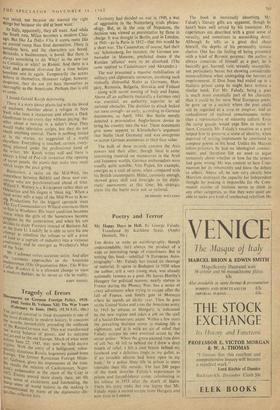Tragedy of Errors
Documents on German Foreign Policy, 1918- ,
1945. Series D, Volume XII: The War ears
(February to June, 1941). (H.M.S.O., 60s.) 111E period covered in these documents is one of the most dramatic in modern history. It concerns the months immediately preceding the outbreak of the Russo-German war. This war transformed the world balance of power, and its outcome Put an end to the old Europe. Much of what went before June 11, 1941, may now be held ancten Peyttne. With the entry of a belligerent, subse- rtientlY victorious Russia, hegemony passed from
"Pe. The former Rumanian Foreign Minis-
rGafeneu, gives his impressions of the time. ee recalls the mission of Caulaincourt, Napo- ambassador i ambassador at the court of the Czar n Events moved more slowly then; Yet the '_a, me sense of excitement and foreboding, the csnaris sense of world history in the making .ts ommunicated by many of the diplomatic dts- Dalehes collected here. Germany had decided on war in 1940, a war of aggression in the Nuremberg trials phrase- ology. But, as in the case of Napoleon, the decision was viewed as preventative by those in charge. It was thought in Berlin, and in London, in 1941—as in Paris in 1812—that this would be a short war. The Cassandras, of course, had their say. Schulenberg, for instance, the German am- bassador in Moscow, predicted doom if the Russian 'alliance' were to be dissolved. (The same applied to Caulaincourt and Alexander.) -
The war presumed a massive mobilisation of military and diplomatic resources, involving such mutually distrustful States as Germany, Hun- gary, Rumania, Bulgaria, Slovakia and Finland —along with secret wooing of Italy and Japan. Above all an authority (naturally a German one) was essential, an authority superior to all national obstacles. The decision to attack leaked out soon enough—as early, according to German documents, as April, 1941. But Stalin merely detected a provocative Anglo-Saxon device to bring his country into the war. These documents give some support to Khrushchev's argument that Stalin liked Germany and was overprone to accept German assurances at their face value.
The bulk of these records concern the Axis powers and their allies; though there is some interesting material on manoeuvres in the Arab and Japanese worlds, German ambassadors were usually quite sensible. Von Papen, for example, emerges as a rock of sense, when compared with his British counterparts. Hitler, curiously enough, showed great skill and foresight in his diplo- matic assessments at this time; his strategic plans for the battle were not so rational.
DESMOND WILLIAMS






































 Previous page
Previous page